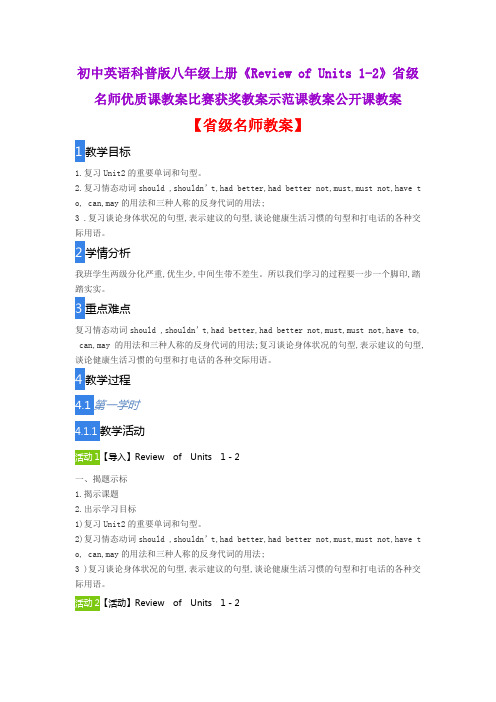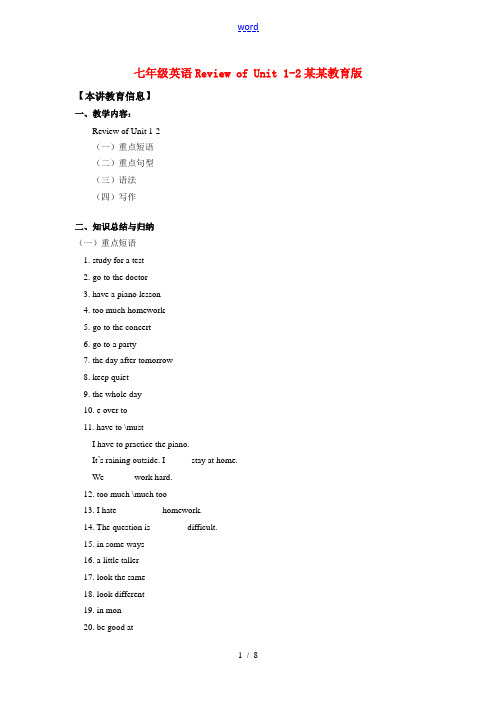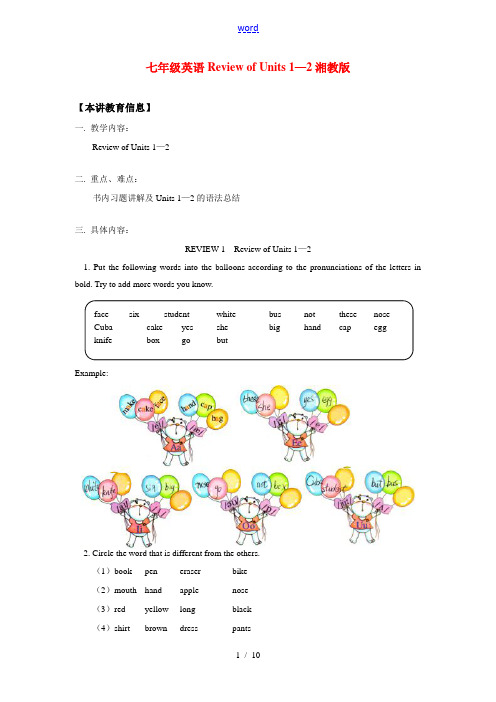公开课Review of Unit 1~Unit 2 Grammar
初中英语科普版八年级上册《Review of Units 1-2》省级名师优质课教案比赛获奖教案示范课教案公开课教案

初中英语科普版八年级上册《Review of Units 1-2》省级名师优质课教案比赛获奖教案示范课教案公开课教案
【省级名师教案】
1教学目标
1.复习Unit2的重要单词和句型。
2.复习情态动词should ,shouldn’t,had better,had better not,must,must not,have t o, can,may的用法和三种人称的反身代词的用法;
3 .复习谈论身体状况的句型,表示建议的句型,谈论健康生活习惯的句型和打电话的各种交际用语。
2学情分析
我班学生两级分化严重,优生少,中间生带不差生。
所以我们学习的过程要一步一个脚印,踏踏实实。
3重点难点
复习情态动词should ,shouldn’t,had better,had better not,must,must not,have to, can,may的用法和三种人称的反身代词的用法;复习谈论身体状况的句型,表示建议的句型,谈论健康生活习惯的句型和打电话的各种交际用语。
4教学过程
4.1第一学时
教学活动
1【导入】Review of Units 1-2
一、揭题示标
1.揭示课题
2.出示学习目标
1)复习Unit2的重要单词和句型。
2)复习情态动词should ,shouldn’t,had better,had better not,must,must not,have t o, can,may的用法和三种人称的反身代词的用法;
3 )复习谈论身体状况的句型,表示建议的句型,谈论健康生活习惯的句型和打电话的各种交际用语。
2【活动】Review of Units 1-2。
七年级英语Review of Unit 1-2山东教育版知识精讲

七年级英语Review of Unit 1-2某某教育版【本讲教育信息】一、教学内容:Review of Unit 1-2(一)重点短语(二)重点句型(三)语法(四)写作二、知识总结与归纳(一)重点短语1. study for a test2. go to the doctor3. have a piano lesson4. too much homework5. go to the concert6. go to a party7. the day after tomorrow8. keep quiet9. the whole day10. e over to11. have to \mustI have to practice the piano.It’s raining outside. I _____ stay at home.We ______ work hard.12. too much \much too13. I hate__________ homework.14. The question is ________difficult.15. in some ways16. a little taller17. look the same18. look different19. in mon20. be good at21. the same as22. be different from23. opposite view24. both 两者,两者都Both books are expensive.We both want to go to the party.His parents are both dead.both …and…Both his brother and sister are teachersHe can speak both French and English.(二)重点句型1. 提出邀请或请求许可Can you …?Sure, I’d like to \Great, I’d like toI’m sorry, I can’t. I have …Would you like…?Could you…?Can you play tennis with me?Can you e over to my house?2. Thanks for asking3. What’s today? —It’s 星期+日期—It’s Friday the 28th.4. Thanks for your invitation.5. Maybe another time6. e and join us.7. Why not do sth.?8. not …until9. Thanks for your last letter.(三)语法形容词、副词比较级1. 用法:用于两者之间的比较2. 常用句型A + be \v. + 比较级+ than + BI am taller than you.He is younger than me.Pedro is funnier than Paul.Tom is smarter than Sam.Jim runs faster than Li Lei.Tom is more athletic than Sam.A+ be\v + much \a little + 比较级+ BHe is much older than meThis desk is a little heavier than that one.He is much more outgoing than me.I’m a little quieter than him.Which is + 比较级,A or B?Which is taller, Lee or Jim?3. 比较级的构成:1)直接加er taller higher older smarter2) e—r nicer3) 辅音+y —ier heavy—heavier4)双写+ er bigger hotter thinner*more + 多音节词more beautiful\important\athletic\outgoing\serious(四)写作根据提示写一封60~80词的信。
七年级英语Review of Units 1—2湘教版知识精讲

七年级英语Review of Units 1—2湘教版【本讲教育信息】一. 教学内容:Review of Units 1—2二. 重点、难点:书内习题讲解及Units 1—2的语法总结三. 具体内容:REVIEW 1 Review of Units 1—21. Put the following words into the balloons according to the pronunciations of the letters in bold. Try to add more words you know.face six student white bus not these noseCuba cake yes she big hand cap eggknife box go butExample:2. Circle the word that is different from the others.(1)book pen eraser bike(2)mouth hand apple nose(3)red yellow long black(4)shirt brown dress pants答案:(1)bike (2)apple (3)long (4)brown 3. plete the sentences. The first letters are given.(1)A:W_________ are you from?B:I’m from England.(2)A:What c_________ are your shoes?B:They’re brown.(3)Hello! Boys and girls, w_________ to China.(4)We are in the same school, but in d_________ grades.(5)Michael’s telephone n_________ is (010)9659-7981.答案:(1)Where (2)color (3)wele(4)different (5)number4. Listen and plete the conversations. Then practice with your partner.(1)A:Where are you from?B:I’m from _________.(2)A:What class are you in?B:I’m in _________, _________.(3)A:Whose _________ is this?B:_________ Robin’s.(4)A:What _________ are your pants?B:They’re _________.(5)A:What does your English teacher look like?B:He is ________, and he has a ________ face.(6)A:________ ________ is his sister?B:She is ________.(7)A:Who is that boy ________ ________?B:He is Li Ming.(8)A:________ do you ________ it?B:C-A-K-E, cake.答案:略5. Match the sentences in Column A with those in Column B.A B(1)Nice to meet you. a. 883-8641.(2)What’s your phone number? b. See you.(3)See you later. c. Yes, it is.(4)Is this your book? d. She is Mary.(5)Where is Jim from? e. Nice to meet you, too.(6)Who is that girl? f. He is from Canada.答案:(1)e (2)a (3)b (4)c (5)f (6)d6. plete the conversations. Then practice with your partner.(1)A:Do you know the boy ______ white?B:Yes. He is my good friend, Michael.A:How do you ______ his name?B:M-I-C-H-A-E-L, Michael.A:Are you in the ______ class?B:No, we ______.A:What ______ is he in?B:He is ______ Class 4, Grade 7.(2)A:______ you know Kangkang?B:Yes, I do.A:______ he have a small head?B:No, he ______. He ______ a big head.A:Does he ______ a wide mouth?B:Yes, he ______.A:Are you in ______ same class?B:Yes, we ______.答案:(1)in spell same aren’t class in(2)Do Does doesn’t has have does the are 7. Look at the picture and plete the conversation with the possessives.Jim:Excuse me, Kangkang. Is this ________ eraser?Kangkang:No, it’s not ________. I think it’s ________.Jim:What’s ________ name?Kangkang:Jane.Jim:Excuse me, Jane. Is this your eraser?Jane:No, it isn’t. It’s ________.Jim:What’s ________ name?Jane:________ name is Michael.Jim:Thank you.Jane:You’re wele.答案:your mine hers her his his His8. Read and plete the sentences.(1)What _______ these in English? They are _______.(2)_______ _______ is this? It is his.(3)Are _______ your _______? No, _______ aren’t.(4)What’s _______? It’s _______ _______.答案:(1)are bikes (2)Whose orange(3)those knives they (4)that a rubber 9. Listen and fill out the table.答案:略10. Find the things in the classroom and write them down.答案:There is a pencil, a knife and a rubber on one/the desk.11. Discuss with your partner and fill in the blanks.(1)A:In Photo 1, what color is A’s T-shirt?B:It’s ______________.(2)A:In Photo 2, ____________________?B:They’re black.答案:(1)yellow (2)what color is C’s pantspare the colors of their clothes in each picture using the sentence patterns above.12. Read the passage and fill in the blanks.Sally White is from the U.S.A. She is twelve. She is a junior high school student. Her father (父亲)is Bill White and her mother(母亲)is Joan White. Her brother(兄弟)is a student, too. They are in the same grade. Sally is in Class Four and her brother is in Class Nine.(1)Sally White es from ________________.(2)Sally is ______________ years old.(3)Sally’s brother is a _______________, too.(4)They are in the _____________ grade.(5)Sally is in Class _________________.答案:(1)the U.S.A. (2)12 (3)student (4)the (5)Four /4 13. Read the passage and answer the following questions.Look at this young man. He’s a Chinese basketball player (篮球运动员). He plays basketball(打篮球)in the U.S.A. He’s very tall and strong and he has long arms. He has small eyes and a big nose. We like him very much(非常,很). Who is he? Can you guess? (Yao Ming.)(1)Does he play basketball in the U.S.A?_________________________________________(2)Where is he from?_________________________________________(3)What does he look like?_________________________________________(4)Do you like him?_________________________________________答案:(1)Yes, he does.(2)He is from China.(3)He has small eyes and a big nose.(4)Yes, I do. Yes, we like him very much.14. Describe the two people in the picture.The girl is … _______________________________________________________________ _______________________________________________________________________________ _______________________________________________________________________________ 答案:The girl is Lingling. She is my classmate. She and her foreign teacher are talking beside the bank in the park.【模拟试题】(答题时间:30分钟)1.She doesn’t want to drink milk now.She doesn’t ______ ______ ______ milk now.2.Florence Nightingale was a nurse. She came from a rich family.Florence Nightingale was a nurse ______ ______ ______ ______.3.Do you often dream?Do you often ______ ______ ______ ?4.They told the boy not to pick flowers.They ______ the boy ______ ______ flowers.5.It’s time for our lunch.It’s time for ______ ______ ______ lunch.6.Don’t worry. I’ll look after your baby carefully.Don’t worry. I’ll _____ ______ ______ ______ your baby.7.People in Japan eat a lot of fish. We eat a lot of fish, too.People in Japan eat a lot of fish. ______ ______ ______.8.It may have different tastes.______ it ______ different tastes.9.All the other girls are standing behind the tallest one.The tallest girl is standing ______ ______ ______ ______ the line.10.It takes about fifteen minutes on foot.It is about ______ ______ ______.11. I didn’t have a rest. I went on writing.I went on writing ______ a rest.12. How sweet her voice is!______ ______ ______ ______ she has!13. Beethoven didn’t say any more.Beethoven said ______ ______.14. The man upstairs always dropped his shoes on the floor, so the man downstairs couldn’t get to sleep.The man downstairs ______ ______ ______ get to sleep ______ the man upstairs didn’t put his shoes ______ on the floor.15. I woke up very late this morning, so I was late for school.I ______ ______ up ______ ______ ______ get to school on time.16. If you don’t study harder, you won’t catch up with the others.If you don’t study harder, ______ ______ ______ the others.17. Lin Tao runs faster than the other two boys.Lin Tao runs ______ of the ______ boys.18. He was surprised to find the girl was blind._____ ______ ______, he _____ the girl was blind.19. This kind of medicine is much too expensive for poor people.The poor people ______ ______ ______ ______ this kind of medicine.20. He is sure to be on time.I’m sure ______ ______ ______ on time.21. I bought this dictionary for 58 yuan.I ______ 58 yuan ______ this dictionary.22. Mark Twain wrote the book.Mark Twain ______ ______ ______ of the book.23. She isn’t free now. She’s at work.She is ______ ______.24. What’s the matter with him?What’s ______ ______?25. Everyone is healthy.______ one is ______.26. Maths is more difficult than physics.Physics is ______ difficult than maths.Physics isn’t ______ ______ ______ maths.27. Do you have a favourite band?______ ______ a band ______ ______ ______ ?28. His first visit to China was in 2000.He ______ China ______ ______ ______ ______ in 2000.29. I can help my father with the farm work, or my brother can help him with it.______ my brother ____ I ______ ______ my father with the farm work. 30. What other things would you like?______ ______ would you like?31. We are all before you.You ______ ______ ______ all.32. She sat ne arest to the doctor’s door.______ ______ sat ______ to the doctor’s door ______ she did.33. Please stand in line.Please ______ ______ your ______.Don’t ______ ______ ______, please.34. You mustn’t put the plastic bags here and there.You mustn’t ______ the plastic bags ______.35. If you play football here, you may break the windows.______ play football here, ______ you may break the windows.36. It seems that our class is going to win.Our class ______ ______ ______.37. My father is working here. My uncle is also working here.______ my father ______ my uncle ______ ______ ______.38. Jim doesn’t know how he can swim.Jim doesn’t know ______ ______ ______.39. Hangzhou is very famous, because of its beautiful WestLake.Hangzhou is ______ ______ ______ beautiful WestLake.40. The weather in England is never too cold or too hot.The weather in English is ______ ______ ______ ______ ______ ______.试题答案1.feel like drinking2.from a rich family3. have a dream4.stopped, from picking to have6.take good care of7.So do we 8.Maybe, has9.at the head of 10.fifteen minutes’ walk11.without 12.what a sweet voice13.no more 14.wasn’t able to, because, quietly15.didn’t get, early enough to 16.you’ll fall behind 17.fastest, three 18.To his surprise, found19.can’t afford to buy 20.he will be21.spent, on 22.was the writer13.busy working 24.his trouble25.No, sick/ill 26.less, as/so difficult as27.Is there, you like best 28.visited, for the first time 29.Either, or, can help 30.What else31.are after us 32.No one, nearer, than33.wait for, turn, jump the queue 34.throw, about 35.Don’t, or 36.seems to win37.Both, and, are working here 38.how to swim 39.famous for its 40.neither too cold nor too hot。
《Review of Units 1—2 》 教学设计

《Review of Units 1—2 》教学设计一、教学目标1、知识目标(1)学生能够熟练掌握 Units 1—2 中的重点词汇、短语和句型。
(2)学生能够理解并运用所学的语法知识,如一般现在时、现在进行时等。
2、能力目标(1)通过听力、阅读和写作练习,提高学生的语言综合运用能力。
(2)培养学生的口语表达能力,能够流利地进行日常交流。
3、情感目标(1)激发学生学习英语的兴趣,增强学习自信心。
(2)培养学生的合作学习意识和团队精神。
二、教学重难点1、教学重点(1)重点词汇:如_____、_____、_____等。
(2)重点句型:_____、_____等。
(3)语法知识:一般现在时和现在进行时的构成及用法。
2、教学难点(1)现在进行时与一般现在时的区别和运用。
(2)如何让学生在实际情境中灵活运用所学的词汇和句型进行交流。
三、教学方法1、任务驱动法通过布置各种任务,让学生在完成任务的过程中掌握知识和技能。
2、情景教学法创设真实的语言情境,让学生在情境中感受和运用语言。
3、合作学习法组织学生进行小组合作学习,培养学生的合作意识和交流能力。
四、教学过程1、导入(5 分钟)通过播放一段与 Units 1—2 主题相关的英语视频或展示一些图片,引起学生的兴趣,导入本节课的复习内容。
2、词汇复习(10 分钟)(1)展示 Units 1—2 的重点词汇,让学生朗读并拼写。
(2)通过单词游戏,如猜单词、单词接龙等,巩固学生对词汇的记忆。
3、句型复习(15 分钟)(1)呈现重点句型,让学生进行模仿造句。
(2)设计情景对话,让学生运用句型进行交流。
4、语法复习(20 分钟)(1)讲解一般现在时和现在进行时的构成、用法及区别。
(2)通过例句分析和练习,让学生加深对语法的理解和运用。
5、听力训练(15 分钟)播放一段与Units 1—2 内容相关的听力材料,让学生完成听力练习,然后核对答案并进行讲解。
6、阅读训练(15 分钟)提供一篇与 Units 1—2 主题相关的阅读文章,让学生阅读并回答问题,培养学生的阅读理解能力。
人教版初中英语初二英语下册《Reviewofunits…》教案及教学反思

人教版初中英语初二英语下册《Review of units…》教案及教学反思一、教案1. 教学目标本次课程旨在通过“Review of units…”单元的教学,使学生回顾并掌握本单元所学的基本知识和技能,在语言输入、输出与语法应用等方面得到充分锻炼。
2. 教学内容本次课程的重点教学内容包括以下方面:1.打招呼及介绍自己;2.谈论未来计划;3.描述人物外貌特征与个性;4.询问与回答时间、日期及节日;5.回顾并掌握本单元所学的语法知识。
3. 教学重难点本次课程的重点和难点主要在于以下几个方面:1.回顾并巩固“一般现在时”、“一般过去时”、“现在进行时”和“将来时”等基本语法知识;2.在交际能力上进行训练,使学生能够流利地进行简单的交际对话;3.鼓励学生在回顾本单元内容的过程中,进行创新和思考,提高他们的语言表达和理解能力。
4. 教学步骤本课程的教学步骤如下:步骤一:导入利用与主题相关的图片、音频、视频等多媒体资料来复习与本单元相关的语言知识,并引起学生的兴趣,为后续教学作好铺垫。
步骤二:预习任务教师将预习任务写在黑板上,让学生对本课程的教学内容有一个初步的认识,并提出问题或建议。
步骤三:导入语言教师通过问答、竞赛等方式来导入本课程的语言内容,鼓励学生积极参与,从而培养学生的语言学习兴趣。
步骤四:语言输入教师通过讲解语法知识、听力、口语、阅读、写作等综合教学手段,对本课程的语言输入进行讲解。
步骤五:语言输出在语言输出方面,教师通过问答、小组合作、分组演讲等方式,鼓励学生进行语言输出的练习,以提高他们的语言表达和理解能力。
步骤六:总结回顾在总结回顾方面,教师应当对本单元中的重点内容进行集中总结,并对学生的学习效果进行评估和反思。
步骤七:作业布置在教学过程的最后,教师可以布置有关本单元的练习、作业或小组合作任务,帮助学生对本单元内容进行进一步巩固和拓展。
二、教学反思通过对本次课程的教学设计和实施过程进行反思,我做出以下几点总结:1.教学目标的具体、明确可操作性导向了教学过程的顺利进行;2.针对不同语言水平的学生,采取了多种语言输入、输出教学策略,使教学效果更加显著;3.在教学过程中,我积极鼓励学生互动交流,提高课堂氛围,增加了课程的趣味性和生动性;4.在下一次课堂教学过程中,应当进一步提高学生的参与度,让他们在深度学习、自主思考的过程中,提高语言技能和表达能力。
《Review of Units 1—2 》 教学设计

《Review of Units 1—2 》教学设计一、教学目标1、知识目标学生能够熟练掌握 Units 1—2 中的重点单词、短语和句型。
理解并能够运用所学语法知识,如一般现在时、现在进行时等。
2、技能目标能够听懂与 Units 1—2 主题相关的对话和短文,并提取关键信息。
能够运用所学词汇和句型进行口头和书面表达,描述日常生活中的场景和活动。
3、情感目标激发学生学习英语的兴趣,培养积极参与课堂活动的态度。
增强学生对英语语言文化的了解和欣赏。
二、教学重难点1、教学重点重点单词:_____、_____、_____ 等。
重点短语:_____、_____、_____ 等。
重点句型:_____、_____、_____ 等。
语法:一般现在时和现在进行时的构成及用法。
2、教学难点现在进行时与一般现在时的区别及正确运用。
如何引导学生将所学知识灵活运用到实际交流中。
三、教学方法1、讲授法讲解重点单词、短语、句型和语法知识,使学生对所学内容有清晰的认识。
2、练习法通过课堂练习和课后作业,让学生巩固所学知识,提高运用能力。
3、情景教学法创设真实的语言情景,让学生在实际情境中感受和运用英语。
4、小组合作学习法组织学生进行小组讨论和合作,培养学生的团队协作能力和交流能力。
四、教学过程1、导入(5 分钟)通过播放一段与 Units 1—2 主题相关的英语视频或展示一些图片,引起学生的兴趣,导入复习内容。
2、知识回顾(15 分钟)带领学生回顾 Units 1—2 中的重点单词、短语和句型,通过提问、默写等方式检查学生的掌握情况。
讲解重点语法知识,如一般现在时和现在进行时的构成、用法及区别,通过例句进行分析和比较。
3、练习巩固(20 分钟)安排课堂练习,包括填空、选择、翻译等题型,让学生巩固所学知识。
组织学生进行小组讨论,共同解决练习中遇到的问题。
4、情景应用(15 分钟)创设一些生活中的情景,如购物、聚会等,让学生分组进行角色扮演,运用所学知识进行交流。
review of units1-6第1课时units 1-2教学设计
初中英语教案第一课时Units1-2教学设计学校唐王中学班级Class_324Grade_8__日期2010-11授课教师肖甜甜课题Revision ofunits 1-2复备区域备课标与教材知识点(语音、词汇、语法等方面)单词:unit1 and unit2单词词组:unit1 and unit2的重点词组(1)、对健康有好处be good formy health(2)、受凉,感冒:have a cold(3)、躺下休息:liedown and rest(4)带蜂蜜的热茶:hot tea with honey(5)看医生:see a dentist(6)多喝水:drink lots of water(7)头痛:have a headache(8)有些,几个:a few……句子:How many hours do yousleep every night?How often do you eatjunk food?What’s the matte?I have acold/stomachache/sore back/sore throat.He shouldn’t eat anythingI’m not feeling well.不仅要学生会读记过单词和词组还要落实书写。
重点、难点(知识、技能两个方面)知识重难点:单词:unit1 and unit2单词词组:unit1 and unit2的重点词组(1)、对健康有好处be good formy health(2)、受凉,感冒:have a cold(3)、躺下休息:liedown and rest(4)带蜂蜜的热茶:hot tea with honey(5)看医生:see a dentist(6)多喝水:drink lots of water(7)头痛:have a headache(8)有些,几个:a few……句子:How many hours do yousleep every night?How often do you eatjunk food?What’s the matte?I have acold/stomachache/sore back/sore throat.He shouldn’t eat anythingI’m not feeling well.技能重难点:How often ,what’s the matter 与其他特殊疑问句的关系分析知识点与知识系统的关系分析确立重难点的依据学生已经学习过现在进行时表示正在发生的事情,因此本单元学习的用这个时态来表示将来对学生来说是一个重点和难点。
八年级英语review 1 review of units 1~2仁爱版知识精讲
初二英语Review 1: Review of Units 1~2仁爱版【本讲教育信息】一. 教学内容:Review 1: Review of Units 1~2核心词汇:last 延续,持续,since 从……以来,since then 从那时起,honor 荣誉,meaning 含义,意思,dangerous 危险的,get lost 丢失了,迷路,on one’s way (to)在某人去…的路上,own 自己的,本人的,拥有,所有,group 组,群,reach 到达,伸手(脚等)够到,children (child的复数)孩子们,儿童们,mistake 错误,弄错,by mistake 错误地,ask for leave 请假二. 重点、难点:1. May I …? 是常用来表示请求允许的句式—May I have some more orange juice?—Yes,of course you may.—May I turn on the TV? –Sorry,you’d better not .对于may开始的提问,回答时如果是否定还可以用No,you mustn’t.(不,不可以。
)只是语气比较强硬。
2. 比较between和among between 指“两者之间”,若接三者或在三者以上物体时,是把这些物体分别看待,指每两者之间:among 指三者或三者以上之中,试比较:She is standing between Ann and me . She is standing among students. She takes some medicine between three meals every day. 注:between three meals 是指在breakfast 与lunch 之间,然后在lunch 和supper之间。
3. Could I speak to sb?我能同某人说话吗?打电话的常用语,could 表示委婉的说法。
reviewU1-2ppt公开课教案教学设计课件案例试卷
1. 收到某人来信 2.等不及做某事 3. 我很高有着
金色短发
1. hear from sb 2. can’t wait to do sth 3. I am tall with short fair hair. 4. I wear glasses.
4. 戴眼镜
5. Thanks for doing sth
What ___(冠词) delicious smell! The pizza ___(look) so nice.Would you like to try___( some)? It looks ____(love), it smells delicious. But the cheese____ (not smell) fresh. It smells too__(强烈) and it tastes ___(有点) sour. The chocolate cookies __ __(做好 了) Have ___(冠词) try! You know. Daming____ ___ ____ ___(爱好甜食) . But taste it ___(one). It might __( be) salt! __ __ _(你确信) that’s sugar? Today everything ____(taste) so sweet! It’s his ___(luck) day.
Look at these sentences.
那闻起来好香啊!
That smells delicious!
它尝起来太味浓。
It tastes too strong.
它尝起来不新鲜。
It doesn’t smell fresh.
它摸起来很软很舒服。
【仁爱版】市优质资源评比优秀作品八年级英语上册ReviewofUnits1-2教案
3.There is going to be a school sports
meet next weekend.
4.When shall we meet?
5.Where shall we meet?
5.They are leaving for Japan the day
after tomorrow.
6. Let's make it half past six.
7. I am very sorry for what I said.
8. Don’t shout at me like that.
9. Would you mind teaching me?
10 . I'm sorry to hear that.
通过复习巩固重点句子及做习题、达到能掌握并灵活运用。
1. there be句型用于be going to句型中。
表示某地将有...
2. say no to sb.
类似的还有:say hello/thanks/goodbye/
sorry to sb.
3.mind doing sth.
介意做某事
4.be sorry for sth. /
16. I'll ring him up later.
17. You should say no to smoking and drinking.
18. It will keep you active during the day.
19. You mustn't throw litter around.
48.引起,造成49.最后,终于50.世纪,百年
根据句意及首字母提示写出单词完成句子。
- 1、下载文档前请自行甄别文档内容的完整性,平台不提供额外的编辑、内容补充、找答案等附加服务。
- 2、"仅部分预览"的文档,不可在线预览部分如存在完整性等问题,可反馈申请退款(可完整预览的文档不适用该条件!)。
- 3、如文档侵犯您的权益,请联系客服反馈,我们会尽快为您处理(人工客服工作时间:9:00-18:30)。
通过……
by mistake 错误地,不小心地
B. travel; feeling
D. traveling; feeling
C. travel; feel
2. (2010无锡)Unlike Chinese, Americans ______ their meals with knives and forks. A. C. used to taking used to take B. are used to taking D. are used to take
Shi Xiaolong used to be/have … ,but now he is/has …
- 版权所有-
How could he get a great success?
being an actor in some movies and TV programs . By ____________ playing By ______________Chinese Kung fu well.
- 版权所有-
by 介词 by后面可以加名词或动名词短语 eg. (1) Some articles are written by Luxun.
(被……)
- 版权所有-
(2)go by train (boat , bus)
乘…… ( 3) I study English by watching English movies.
- 版权所有-
3.(2010汕头龙湖区中考模拟)---I _______ stay up late. ---Really? I didn’t. But I ______ working in the night. A. am used to; am used to C . am used to; used to B. used to; am used to D. used to; used to
- 版权所有-
Notes: get/be used to doing sth; used to do sth和be used for doing sth的区别
get/be used to doing sth used to do sth. 习惯做某事 过去常常做某事
be used for doing sth. 被用于做某事
Review of Unit1 & Unit2
(Grammar) Grade 9
- 版权所有-
Theme(主题):How can fillwe in the information get a great card. success
Read the reviews quickly, and
- 版权所有-
- 版权所有-
Hale Waihona Puke - 版权所有-Listen and fill in the blank
short Sun Yanzi used usedto tohave __________ hair, but now she has _____ long curly hair. She used used to to be a little shy but now she is _______________. ___________, more outgoing pants She used to wear ____________. Now she likes live in dress wearing ______________. She used to _______ Singapore , but now she lives in Taiwan. Many Almost everyone knows her. people like her. __________
- 版权所有-
在英语中,“used to +动词原形”这一结构表示过去的习惯(过 去经常反复发生的动作)或状态(现在已不复存在),只有一 种形式,即过去式,用于所有的人称. 肯定句: 主语+ used to +动词原形 He used to play football after school. 主语+ didn’t use to+动词原形 He didn’t use to play football after school.
否定句:
一般疑问句: Did+主语+use to…? Did he use to play football after school? Yes , he did ./ No , he didn’t . 反意疑问句:主语+used to …, didn’t +主语代词? He used to play football after school, didn’t he?
- 版权所有-
中考链接
1(2010中山一中中考模拟)– Mr. Smith told me that he wasn’t used to ________by plane and he used to ______ sick a lot.
A.
traveling; feel
4. (2010中山一中中考模拟)The knife is _________
cutting things.
A. used to B. used for C. use to D. use for
- 版权所有-
What did he use to look like? active;no hair; short;thin What does he look like now? serious;short hair;tall;a little heavy
